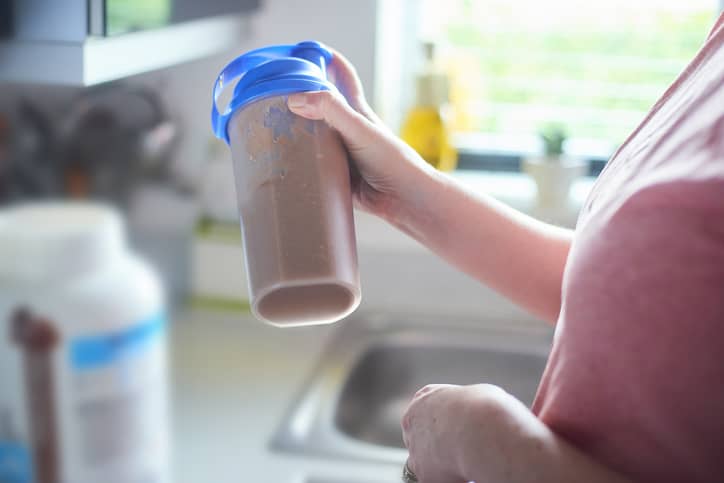So, you’ve done your research on supplementing your diet with protein powder and have decided which type of protein powder you want to try – but you might still be wondering how, when and how much protein powder to take.
How much protein powder should you take?
The recommended daily intake of protein is around 55.5g for males and 45g for females.
For most people, about 15g to 25g of protein – whether from a powder or another protein source – consumed after a workout or intense exercise session is enough for optimal muscle protein synthesis (which is how the body builds up muscle mass).
It’s recommended that athletes, including bodybuilders, consume 1.2g to 2g of protein per kilogram of body weight.
You’ll need to follow your protein powder dosage instructions carefully, but as a guide, a whey protein shake contains about 20g of protein.
When should you take protein powder?
It’s recommended that you eat a meal or snack containing carbohydrates, protein and fluids after exercise. A protein shake is an easy way to consume a large amount of protein without having to prepare a meal and can also be more appetising than trying to eat protein-rich food just after exercising.
Can a protein shake replace a meal?
Protein shakes don’t offer the key nutrients and vitamins that you get from a balanced meal, so they shouldn’t replace food. In fact, you can get all the protein your body needs by eating a balanced diet that includes protein-rich foods. If you’re exercising intensely, you’ll also need some carbohydrates after a workout to help your body recover.

Is protein powder safe?
It’s important to purchase your protein powder from a reputable source, like a pharmacy, and follow the dosage instructions carefully. As with all medicines and supplements, if you’re unsure whether protein powder is right for you or if you experience any side effects after taking it, speak to your doctor.
Don’t be tempted to take more protein powder than you need – medical experts advise against consuming more than twice the recommended daily protein intake. Getting too much protein may increase your risk of a condition that affects the bones, causing them to become weak and fragile and more likely to break (osteoporosis), and worsen pre-existing kidney problems.
Until more research has been done, it’s not recommended that children use protein powder.
Does protein powder make you gain weight?
Believing that eating a high-protein diet will give you bigger muscles is a common misconception. Some protein supplements are high in calories, plus, it’s actually possible to eat more protein than you can use, which your body will then break down and store as fat – this can lead to weight gain.

Does protein powder expire?
Like all supplements, protein powders do come with an expiration date. Some research suggests whey protein powder lasts for 9 to 19 months when stored properly. Most protein powders have additives that mean they last for up to 2 years. While there is no high-quality research investigating the safety of using expired protein powder, it’s not recommended.
Key points
- 15g to 25g of protein consumed after intense exercise is usually enough for building muscle mass
- follow protein powder dosage instructions carefully
- protein shakes shouldn’t replace regular meals
- taking too much protein powder may cause health problems and weight gain



